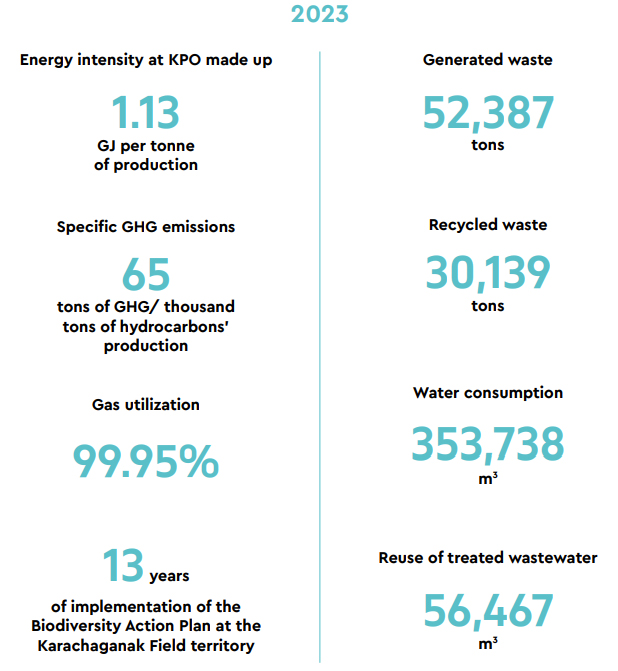ENVIRONMENTAL IMPACT
|
Business principle:
Environment
|
We have a systematic approach to environmental management in order to achieve continuous performance improvement. To this end, we manage these matters as critical business activities, set standards and targets for improvement, and measure, appraise and report performance externally. We continually look for ways to reduce the environmental impact of our operations. |

Climate change and energy transition
In 2023, KPO prepared an Environmental Vision for the period until the end of the FPSA (2037). This concept formed the basis of the KPO Green Strategy and the KPO-365 Business Strategy.
The KPO Green Strategy was developed in 2023 in line with the country strategic plans and takes into account global world trends for reduction of the carbon footprint of products.
The KPO Green Strategy covers five (5) key areas: GHG reduction vision, power strategy, offsetting strategy, water management and waste management.
- GHG reduction vision
KPO continues evaluating the best engineering solutions and conduct studies aimed at reducing its GHG emissions. Based on the results of this work, decisions are made to implement both short and long-term projects. As of I Quarter 2024, the GHG reduction vision includes heat integration projects and studies on the development of renewable energy sources, offset projects and other alternatives. - Power strategy
The main objective of the power strategy is to ensure stable electricity supply that meets current and future KPO requirements as well as export obligations under the FPSA, taking into account the need to reduce greenhouse gas emissions, comply with regulations and implement the best available technologies. In 2023, the project concept selection phase was finalised and work is continued by Project Execution team. - Offsetting strategy
Carbon offset projects play an essential role in the decarbonisation process in the short to medium terms as other solutions gain momentum. Through the offset strategy, KPO intends to compensate the shortfall in GHG emission quotes in addition to projects aimed at reducing GHG, and to ensure that carbon neutrality targets are met in the long term. In 2023, the feasibility of offset projects in the West Kazakhstan Oblast was assessed, and potential opportunities in sustainable agriculture and waste management were identified. - Water management
Taking into account global and local water security risks, KPO aims to improve the efficiency of water resources utilisation by increasing the use of recycled water for technical needs of production facilities, introducing water-saving and digital technologies. The Aksai Sewage Treatment Plant Upgrade Project is assessed as one of the major alternative long-term sustainable sources of technical water. In 2023, the project passed the concept selection stage and was transferred onto the Projects Execution team. - Waste management
In 2023, KPO performed a comprehensive analysis of the waste management system and developed an action plan aimed at improving waste management practices. The plan’s activities are focused on reducing waste generation, minimising waste transfer over distance, and maximising recycling and reuse through the implementation of advanced technologies.
The climate agenda is a major challenge for the entire oil and gas industry. It is essential for KPO to contribute to addressing climate change and to achieving carbon neutrality goals in order to ensure compliance with legislative requirements, remain competitive and sustainable in a changing global energy system.
An important event in 2023 was the release of the Republic of Kazakhstan’s Carbon Neutrality Strategy 2060, a document that sets ambitious zero-carbon targets and identifies the key transformations needed to decarbonise the country.
